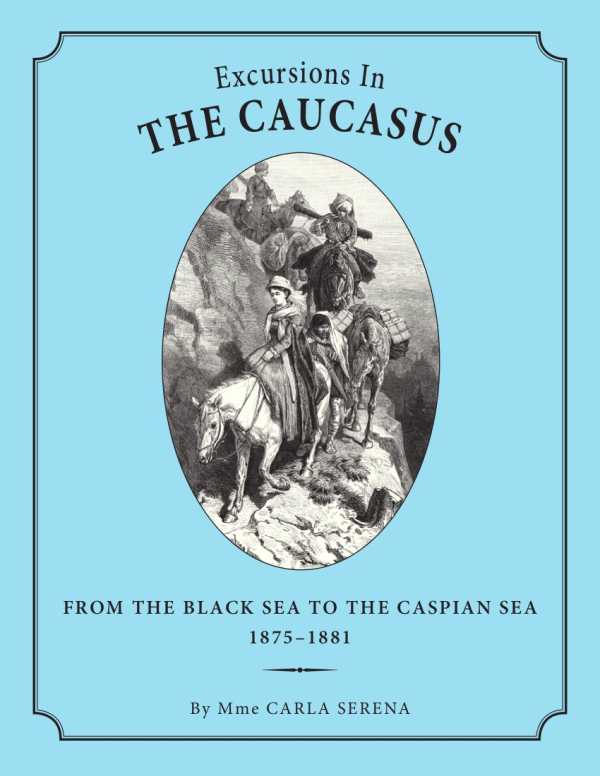
Excursions in the Caucasus
From the Black Sea to the Caspian Sea: 1875 - 1881
This newly translated travelogue is measured in the sound of the wheels of carts and the clatter of hooves.
The Caucasus has never lacked for attention from travelers. From ancient times to the present day, historians and writers have scrutinized the mysterious place of imprisonment of Prometheus, the home of Medea and the Golden Fleece, a plum piece of land, the birthplace of dictators and adventurers. Strabo left us a detailed description of Colchis, and Alexandre Dumas makes reference to it this way: “The silver tops of the double Caucasian chain still shone in the sky, like petrified clouds.”
With all this, is there room for one more? Forgotten for over a hundred years, a French-language account has been published in English by Narikala Publications: the travelogue Excursions in the Caucasus: From the Black Sea to the Caspian Sea: 1875-1881, by Madame Carla Serena. It differs from much of the writing about the Caucasus and Georgia. First, the author is an intrepid woman traveling around the Caucasus in the late nineteenth century, an occupation that to this day is not entirely safe, and she notes the reaction of men along the way: “General Staroselski, civil administrator of the Caucasus, could not refrain from telling me ‘Your heroism borders on madness.’”
Second, it is an observant social history. Written with ease and avoiding superfluous details, the narrative moves from village to village as Serena’s keen eye picks out features of the seldom-traveled road: “Elsewhere, under the shade of the majestic walnut, a no less picturesque tableau is to be seen: it’s a group of horsemen who are taking a rest with their mounts: princes, nobles, and peasants.” Her history is measured in the sound of the wheels of carts and the clatter of hooves, is enhanced by more than 150 exquisite line drawings, many of great ethnographic interest.
Offered for the first time to English speakers, the travelogue of Carla Serena is a book for fans and Caucasus specialists alike. The liquid borders of the time in which she traveled this region still trouble the country today, and their fluidity and uncertainty will be of interest to anyone trying to understand conflicts and Russian imperialism in this rich and fascinating region. The forgotten traditions, customs, and way of life Serena describes draw the reader in through detailed observations of a person who clearly cherished her experience.
Reviewed by
Lado Pochkhua
Disclosure: This article is not an endorsement, but a review. The publisher of this book provided free copies of the book to have their book reviewed by a professional reviewer. No fee was paid by the publisher for this review. Foreword Reviews only recommends books that we love. Foreword Magazine, Inc. is disclosing this in accordance with the Federal Trade Commission’s 16 CFR, Part 255.
